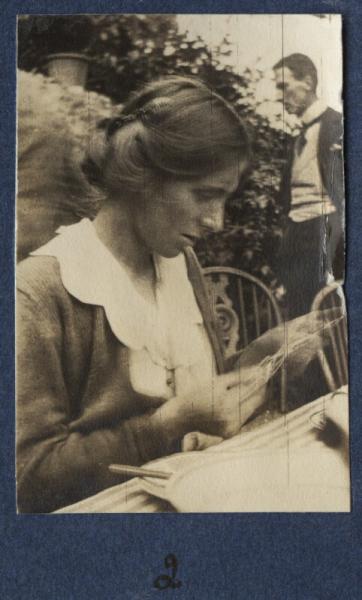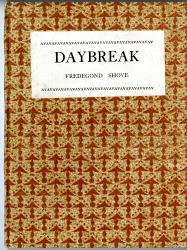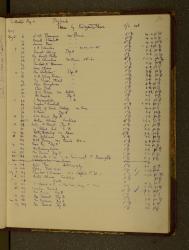Fredegond Shove
Biography
Authored By: Sophie Lord
Edited By: N/A
Fredegond Shove (née Maitland) was born at Downing College, Cambridge in 1889. Her mother, Florence Maitland (née Fisher and later Darwin), was a first cousin of Virginia Woolf, by way of her aunt Julia Stephen to whom she was closer in age. Fredegond’s father was Frederic William (‘F.W’) Maitland, a legal historian, Cambridge don and friend of Leslie Stephen. Maitland later wrote Stephen's biography. It was in the Stephens’ Hyde Park Gate drawing room that Fredegond’s parents met and as a result of their matchmaking became subsequently engaged. The Maitlands married in 1886 and had two daughters; Ermengard was born within a year, two years before Fredegond.
Florence Maitland’s love of animals meant the family home was always full of creatures, from cats and dogs to marmosets and monkeys. The family lived primarily in Cambridge and spent their vacations in Gloucestershire; in 1897, when the Stephens took a house nearby in Gloucester after Virginia Woolf's half-sister Stella Duckworth’s death, the two families became closer. However, shortly before the turn of the century, the Maitlands began to spend winters in Gran Canaria due to Frederic’s ill health. The sisters were informally taught by their parents and were encouraged to pursue the activities they enjoyed and were best at; Ermengard described their early education:
"My sister, with her impossible sums and still more impossible handwriting rushed headlong into writing poems and plays. We both acted and invented and listened...Considering [Frederic Maitland's] labours on behalf of degrees for women, it seems to me odd that we were allowed to drift so pleasantly" (Bennett 24).
However, this time away made it difficult for the sisters to integrate back into Cambridge life in the spring each year; in her memoir, Fredegond recalls:
"By April we were in Cambridge again, […] ourselves a little more absorbed, intolerant and devoted, a good deal more hostile to the idea of making friends with young people and governesses - growing up in our own imaginative world, [it became] a cynical, and slightly morbid world whose denizens had the cachet of a nightmare" (Shove 25).
Frederic Maitland died in 1906 shortly after finishing Leslie Stephens’ biography which Virginia Woolf helped him to write. At this time Fredegond was at a convalescent home in Bex, Switzerland for a second winter. She was sent for a "cure" along with Frances Darwin (later Cornford). The details of why she was there remain largely unknown, even to her cousin Mary Bennett who simply wrote that: “her parents were much worried about her" (Bennett 24); although she does also suggest that Fredegond was prone to extremes of mood. The family settled in Brookthorpe, Gloucestershire a couple of years after Frederic’s death. It seems that Fredegond struggled with everyday life; she briefly attended drama school and at another time was perceived to have a form of anorexia. It was advised that she might benefit from the structure of a formal education and so in 1910 she attended Newnham College, Cambridge. She studied English for three years without sitting examinations, began writing poetry and befriended Alix Sargant Florence (later Strachey) and Hope Mirrlees. The Maitlands continued to spend winters in Cambridge and summers in Gloucestershire, however Fredegond spent much time in London with her uncle and aunt, composer Ralph and Vaughan Williams and his wife Adeline. It was also in 1913 that Florence Maitland remarried to Sir Francis Darwin, the son of Charles Darwin and the father of Fredegond’s friend Frances.
Fredegond first met her future husband Gerald Shove at a tea party at King's College, Cambridge sometime before the beginning of World War One, however it was after their second meeting in the rooms of Ka (Katherine) Cox during the war that they began their relationship. Here the couple "sat together all evening talking of war and peace and all things and people in life including Punch and Judy. The evening led to others and to an ever-opening joy for me. The days so full of pain for others were full of such joy that it hurt like flames" (Shove 30-1).
Gerald Shove, born in 1887, was one of The Apostles of King’s College, Cambridge. In 1911 he had moved into the Stephens’ Brunswick Square house, living alongside Virginia (then Stephen) and her brother Adrian Stephen as well as Leonard Woolf, Maynard Keynes and Duncan Grant. He is often considered as a figure on the fringes of Bloomsbury. When Gerald and Fredegond met, he was introduced to Fredegond as a pacifist, running a journal named War and Peace for Labour MP, author and pacifist Norman Angell.
In the summer of 1915, Gerald temporarily lived with Vanessa Bell, as did Roger Fry, at The Grange in Chichester; Gerald and Fredegond’s imminent engagement was a prime topic of conversation. Early in September they finally married and then honeymooned in Yorkshire. As a conscientious objector, Gerald was awaiting his tribunal and they spent time in London before this began, living at his rooms in Gower Street. During this period the Woolfs were at Ash[eh]am in Sussex where Virginia was recovering from a mental breakdown and the Shoves were two of the very few visitors. Gerald’s tribunal then sent him to work first on a farm near Cheltenham. The work was exhausting and Fredegond recalls that their “life had grown very strenuous and anxious” (Shove 33). However, when the farmer suddenly gave notice to all the conscientious objectors he had employed, the Shoves briefly returned to London, to their “dear old haunts near the British Museum and Tottenham Court Road” (33).
In 1916 after their short break in London, the Shoves went to Garsington, the home of their friends Phillip and Lady Ottoline Morrell; here they lived in a cottage on the grounds and Gerald laboured on their farm. Not only did the Morrells provide easy work for conscientious objectors, but their home was also a social hub. Residents and regulars included Clive Bell, Mark Gertler, Lytton Strachey, Dorothy Brett, Dora Carrington, Bertrand Russell, Aldous Huxley, D.H. Lawrence, Katherine Mansfield and J.T. Sheppard. Woolf notes a visit there in November 1917 in her diary; she was amused by and found the goings-on there bizarre, yet she respected the pacifist support system that the Morrells’ had established. In her memoir, Lady Ottoline recalls Fredegond:
"Fredegond was an enchanting creature, very sensitive, delicate and highly strung, with a fantastic imagination […] she always liked me and I was very fond of her and enjoyed her witty, fantastic conversation. She was untidy in appearance, but had a delightful, sensitive, witty mouth and pale grey eyes that looked far into a world of her own. She was a cousin of Virginia Woolf and slightly resembled her" (Newman 27).
The Shoves stayed there for two winters and Fredegond had secured an agreement with Blackwells to publish her first collection of poetry, Dreams and Journeys, before they left; the recurring headaches and sleeping difficulties that she suffered from meant she had struggled to get her poems into a publishable state.
At the beginning of 1918 the Shoves were back in London, staying in a small hotel opposite the British Museum while Gerald looked for more work. Between January and April, Virginia and Fredegond saw each other weekly. Woolf writes in her diary and to Vanessa Bell about suppers with Fredegond and dinners out with her and Gerald; Bloomsbury gossip was usually a topic of conversation between them, particularly during their regular meetings at the 1917 Club. Fredegond was close friends with the group Woolf called the “Bloomsbury bunnies” or “crop-heads” which included Carrington, Alix Sargant-Florence, Barbara Hiles (later Bagenal) and Dorothy Brett. However, Woolf suggests in her diary that her feelings for Fredegond went deeper than those she had for the ”bunnies”: “Fredegond walked with me to Charing Cross. I feel like her in some fundamental way” (Woolf 104). Hilary Newman has suggested that: “For Woolf, Shove was a link to the past and to Frederic and Florence who had been highly valued by the Stephen parents” (Newman 25). In fact, Woolf herself had “highly valued” Frederic and Florence, particularly for the comfort and support they provided after her own parents had passed away.
Next the Shoves went to Tatsfield in Surrey, to a farm run by a mental health specialist. This was unusual in that the patients were employed in the same work as Gerald and his days were spent amongst them. Fredegond recalls a patient that Gerald brought back to tea who was once an esteemed actor:
"to Gerald and me his mental troubles seemed but an intensity of realisation, and so it was with them all. They were saner than sane, if sanity means some chief central truth of feeling" (Shove 35).
While their days were often lonely and morbid, in the evenings they would sit together by the fire and reread their favourite books, from Jane Austen to Leo Tolstoy, as well as contemporary novels – a habit they kept up for the rest of their lives. When the end of the war came, they returned to London and began living in a family hotel before they moved to a house belonging to Fredegond’s aunt and uncle. Gerald got a job working on The Economist and Fredegond relished his office tales when he returned at the end of the day. Fredegond was lonely and desperately wanted children; she was told by a specialist there was no reason why she should not conceive, however she never fell pregnant. She filled some of her time by working in the head office of the charity Save The Children. At this time, and continuing throughout 1919 and 1920, Fredegond was regularly published in The Athenaeum. Virginia Woolf’s diary entries also confirm that the two resumed their regular meetings when Fredegond returned to London.
In September 1919, Gerald’s temporary job on The Economist came to an end. Fredegond suggested that they go to Cambridge as it would be easy for Gerald to get a job at the university, and they left the next day. Woolf’s diary and letters record the continuing presence of the couple in London into 1920, however after Fredegond’s mother’s death in April there are no more visits. It was at this time that she became involved with Catholicism. On her deathbed her mother gave her a kitten they named Cuckoo which Fredegond writes of in her memoir: “We lavished on her all the love that had grown from our love for each other, and the longing for a home and children in the years of our wandering” (Shove 40). Despite Fredegond’s increasingly different values, the Woolfs published Daybreak, her last collection of poetry during her lifetime, at the Hogarth Press in 1922. In February 1923, Woolf describes a trip to Cambridge and lunching with the Shoves a while after Fredegond has been confirmed into the Catholic Church; Woolf writes sceptically of this new-found faith – and this visit is apparently the last time that they met. After Fredegond’s death, her sister Ermengard wrote that: “viewing the whole of her work, one can trace the putting off of Bloomsbury, the putting on of Catholicism, the growing ardour of her love for animals, her deepening fears." (Maitland "Preface" viii).
Gerald had been lecturing in Economics and in 1926 he was made a Fellow of King’s College, Cambridge; Fredegond fondly looks back at this as a time of “prosperity” and stability:
"We had many comforts now and when Gerald's Fellowship came our times became broadly, almost in our own view mayorally, prosperous. We had grand trunks for travelling, several suits each and a well beloved daily cook who stayed with us for fourteen years, going with clock-like regularity" (Shove 40).
When their cat, Cuckoo, died, they began to take in strays, apparently at one point having eighteen of them in their home. The couple integrated into Cambridge life, Gerald serving on numerous university boards and committees and Fredegond attending dinners with him when she was not nursing sick cats back to health. She continued writing poetry however she published only once more, a critical study of Christina Rossetti in 1931, published by Cambridge University Press. Throughout these years Fredegond also recalls travelling and holidays to France. Although it appears that the Woolfs and Shoves were no longer in contact, Fredegond wrote an emotional letter of condolence to Leonard Woolf on hearing of Virginia’s death.
Two years after being appointed University Reader in Economics, Gerald’s declining health led to his admission to hospital where he was told he had a terminal illness; they went to the Sand Dunes Nursing Home in Hunstanton and he passed away a few months after his original diagnosis. Fredegond returned to Lilac Cottage, Cambridge, where she spent her final two years, claiming to feel Gerald’s presence with her always. Her sister Ermengard described sorting through her house after her death in September 1949:
"[Poems] were everywhere. Fairly copied in note-books, scribbled on bits of paper, stuffed into bookcases, cupboards and desks - one would not have been surprised to have found them in the oven - literally hundreds of poems" (Maitland “Preface: the Child and the Poet” ix).
Mary Bennett, a cousin who helped in this process, provides a perspective on Fredegond’s poetry:
"Time and again, as we went through the mass of paper, we would come upon lines that made one feel 'but this is the real thing', only for the poem to run out not so much into sand as into mush. If only - but if only, what? If only Fredegond had had an element of the Stephens' steel? As it was, reading what she had left was like looking at an unusual plant that produces innumerable buds but can never quite flower" (Bennett 30).
With what she found along with some memoirs and previously published poems, Ermengard had Gerald and Fredegond Shove privately printed in 1954 for friends and family. Cambridge University Press then went on to publish a selection of Fredegond’s poems in 1956. Some of her work continues to be printed in anthologies, however she is now best known for her uncle’s, composer Ralph Vaughan Williams’, setting of Four Poems by Fredegond Shove for Baritone and Piano (1922).
Works Cited
Bennett, Mary. “Ermengard and Fredegond Maitland.” The Charleston Magazine, 21 (2000). 22-30.
Maitland, Ermengard “Preface.” Poems by Fredegond Shove, edited by Ermengard Maitland, Cambridge: Cambridge University Press, 1956.
Maitland, Ermengard. “Preface: the Child and the Poet.” Fredegond and Gerald Shove, edited by Ermengard Maitland, Ermengard Maitland (Private Printing), 1952.
Newman, Hilary. “Virginia Woolf and Fredegond Shove: A Fluctuating Relationship.” Virginia Woolf Bulletin, 39 (2012), 24-32.
Shove, Fredegond. Gerald and Fredegond Shove (Brookthorpe, Gloucester: Privately printed for Ermengard Maitland, 1952.



